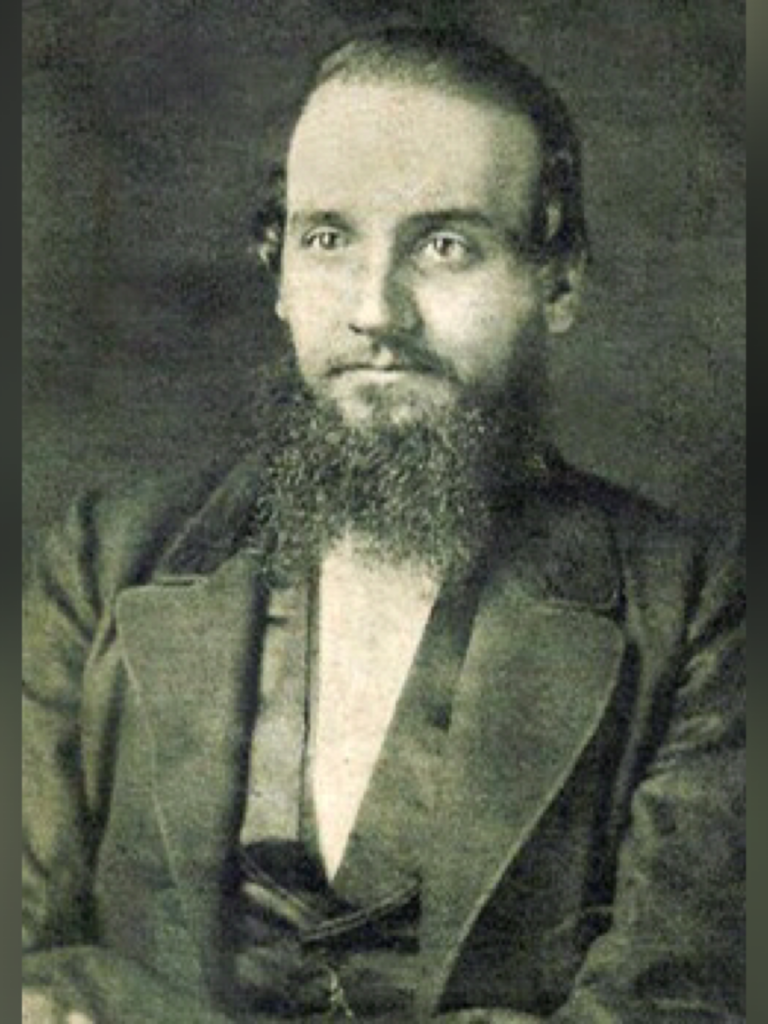
When talking about short-lived instances in history, it is largely the leaders who get mentioned. They receive all the praise and criticism associated with such an event. For John Brown’s raid of Harpers Ferry, it is only natural that history books largely talk about John Brown. Too often forgotten is the second in command: a young, handsome, towering man by the name of Aaron Dwight Stevens. Stevens was a passionate military man who adamantly despised the nature of slavery. He wanted the chance to fight for what he believed in. This article is designed to remember a largely forgotten figure and his role in the fight for abolition.
Pre-Abolitionist
Stevens was born in a Puritan household in Lisbon, Connecticut on March 15, 1831. His family owned a farm, and were known for their pacifist values and prominence in the local church[1]. Although it was expected for him to live his life the same way, Stevens had greater ambitions to do something bigger than himself. His great-grandfather was a captain in the Revolutionary army[2] and Stevens desired to follow in his heroic footsteps.
At age 16, Stevens left home and joined the Massachusetts Regiment so he could fight in the Mexican-American War[3]. After being honorably discharged from the Army following the War, Stevens joined the First United States Dragoons in New Mexico. It was here that he found himself in trouble for the first time. He was arrested for “mutiny, engaging in a drunken riot, and assaulting Major George A. H. Blake of his regiment”[4]. Stevens was initially sentenced to death, but was given some leniency by then Secretary of War Jefferson Davis and President Franklin Pierce. Instead, he was able to serve three years of hard labor.
Harpers Ferry
It was after Stevens escaped imprisonment for his crime that the prominence of his story came to fruition. He abhorred slavery and believed it was the truest form of evil in the world. The young man had heard of like-minded people in Kansas fighting the good fight and found the need to join them. He joined a group called the “Border Ruffians” who were against those promoting slavery. There, he met John Brown and grew to become his second in command.
As history tells us, the raid on Harpers Ferry was a key point in the abolitionist movement of people acting on their ambitions and attempting to make real changes to the act of slavery in the United States. Brown and Stevens were at the forefront of this act. The ultimate goal of the raid was to flee the area’s slave population. However, this could only be accomplished by seizing the arsenal at the ferry first and foremost. After cutting the communication lines, and overpowering the sentries, it seemed like Brown’s plan had legs and could work. However, their fire power came up short and they were quickly surrounded.
It’s believed that Stevens recognized the inevitability of the loss and held up a white flag as an act of surrender. Unfortunately, his actions were misinterpreted and Stevens was shot seven times. Miraculously, these 7 bullets did not kill Stevens, but his role in the raid would lead to his death regardless, as he was hanged for his actions on March 16, 1860[5].
Lasting Impressions
Many don’t understand the significance of this event and the heroes who participated. Truthfully speaking, it was a failed mission, but the significance comes from the motives behind the actions. Harpers Ferry showed that there were people who wouldn’t stand for the injustice taking place. Thus, further raising the tension between the abolitionist and slaveholders leading up to the Civil War. For Stevens himself, he was an incredibly interesting character whose beliefs were ahead of his time.
George B. Gill, an activist associated with John Brown wrote about Stevens in 1860: “Stevens–how gloriously he sang! His was the noblest soul I ever knew. Though owing to his rash, hasty way, I often found occasion to quarrel with him more so than with any of the others, and though I liked (John Henry) Kagi better than any man I ever knew, our temperaments being adapted to each other, yet I can truly say that Stevens was the most noble man that I ever knew”[6]. Stevens was a rash, quarrelsome individual who had his beliefs in order. This combination led to his ambitions to fight for what he believed in and was what made him so interesting.
Legacy
Stevens should be remembered for his selflessness and ability to put the injustices shown to others before his own safety. This incredible trait was shown in a letter he wrote to friend Jennie Dunbar while waiting his hanging in 1859: “Slavory(sic): demands that we should hang for its protection, and we will meet it willingly, knowing that God is Just, and is over all. There seems to be no mercy, for those who are willing, to help those who have none to help them. My heart, feel’s like bleeding, to think how many thousand’s, are worse off. in this land, than I am now. Oh that I could see this country free, I would give a thousand lives if I had them to give”[7].
Although it seems like that Stevens would gladly take the end result of abolished slavery over his own recognition, it is a shame that so few people recognize his name. Aaron Dwight Stevens was a man with beliefs before his era and the bravery and ambition to fight for those beliefs. In August of 2018, Connecticut area officials began clamoring for a pardon of his crimes posthumously. This action seems to be about 160 years too late, but for Stevens, he would simply be happy to see this conversation taking place in “a world better than (his), that is: where the chances of doing good, are better”[8].
[1] https://www.courant.com/news/connecticut/hc-news-norwich-pardon-abolitionist-harpers-ferry-20180802-story.html
[2] http://www2.iath.virginia.edu/jbrown/men.html
[3] https://www.courant.com/news/connecticut/hc-news-norwich-pardon-abolitionist-harpers-ferry-20180802-story.html
[4] http://hd.housedivided.dickinson.edu/node/19465
[5] http://abolitionist-john-brown.blogspot.com/2007/06/remembering-aaron-dwight-stevens-john.html
[6] http://www2.iath.virginia.edu/jbrown/men.html
